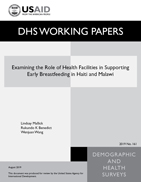- PUBLICATIONS
- JOURNAL ARTICLES
- ACCESS PUBLICATIONS
Publications Summary
- Document Type
- Working Papers
- Publication Topic(s)
- Health facilities/SPA surveys, Nutrition
- Country(s)
- Malawi, Haiti
- Language
- English
- Recommended Citation
- Mallick, Lindsay, Rukundo K. Benedict, and Wenjuan Wang. 2019. Examining the Role of Health Facilities in Supporting Early Breastfeeding in Haiti and Malawi. DHS Working Paper No. 161. Rockville, Maryland, USA: ICF.
- Download Citation
- RIS format / Text format / Endnote format
- Publication Date
- August 2019
- Publication ID
- WP161
Download
 Examining the Role of Health Facilities in Supporting Early Breastfeeding in Haiti and Malawi (PDF, 1503K)
Examining the Role of Health Facilities in Supporting Early Breastfeeding in Haiti and Malawi (PDF, 1503K)
 Examining the Role of Health Facilities in Supporting Early Breastfeeding in Haiti and Malawi (Analysis Brief)
Examining the Role of Health Facilities in Supporting Early Breastfeeding in Haiti and Malawi (Analysis Brief)
Download this publication
Associated publication(s):
There is no printed copy available to order.
